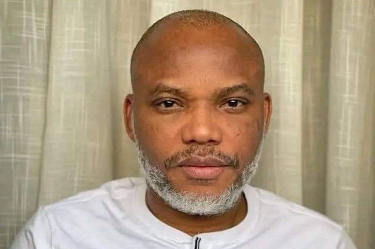Barrister Njoku According to Jude Njoku, one of the attorneys representing Nnamdi Kanu, the Nigerian Supreme Court’s 2023 decision in the case of IPOB leader Indigenous People of Biafra is unconstitutional, per incuriam, and a mockery of the legal system.
Njoku informed reporters that the Supreme Court’s decision to reverse an earlier Appeal Court decision that exonerated Nnamdi Kanu of all terrorism-related charges and released him was a mistake.
According to BASEMEDIA, the Supreme Court reversed the Court of Appeal’s October 13, 2022 ruling in Federal Republic of Nigeria v. Nnamdi Kanu (SC/CR/1364/2022).
On December 15, 2023, the Supreme Court overturned that ruling.
In doing so, the nation’s highest court noted that the lower court had not made a determination regarding the accused’s guilt or innocence based on the evidence.
In order to preserve the charges and open the door for a retrial, the highest court also relied on a stay of execution issued by the Court of Appeal on October 28, 2022. Speaking on behalf of the Mazi Nnamdi Kanu Global Defence Consortium, Njoku claimed that the Supreme Court’s justification for overturning the Court of Appeal’s decision was “per incuriam—a judgment delivered in ignorance of binding precedents, logically absurd, and constitutionally dangerous.”
He emphasized that Nigerian law makes it abundantly evident that a court’s proceedings are void and cannot be revived once it lacks jurisdiction.
In support of his claims, he cited cases like Ogbebor v. State (2002) 1 NWLR (Pt. 748) 336, Abacha v. State (2002) 5 NWLR (Pt. 761) 638, and Madukolu v. Nkemdilim (1962) 2 SCNLR 341. Therefore, he reasoned, “a discharge for want of jurisdiction is the end of the matter, not a provisional holding.”
The attorney also criticized the use of the Court of Appeal’s stay of execution, pointing out that “acquittals or discharges cannot be’stayed’ under Nigerian criminal law.” Only civil cases or interlocutory rulings are subject to stays.
The Court of Appeal maintained charges that had previously been declared void by delaying the discharge of October 13, 2022. He pointed out that the Supreme Court then used this ruse to mandate a retrial, which is specifically prohibited by both Abacha and Ogbebor.
Njoku further contended that the constitutional ban on double jeopardy is violated by Kanu’s retrial.
He noted that “Section 36(9) forbids retrying a person after acquittal,” emphasizing that the discharge had finality once the Court of Appeal, a competent court, dismissed the charges as illegal.
He emphasized that “the protection against double jeopardy is effectively abolished when it is treated as tentative until guilt or innocence is tested on the merits.”
“If this logic stands, then any discharge based on lack of jurisdiction can be overturned until a trial on the merits is conducted,” he added, warning that the Supreme Court’s precedent was dangerous. In doing so, jurisdiction—a constitutional protection—becomes a pointless formality.
Additionally, the defense team cited the case’s global scope, citing the June 24 High Court of Kenya decision that ruled that Kanu’s kidnapping and transfer to Nigeria were illegal due to torture and violations of the African Charter and the International Covenant on Civil and Political Rights.
The attorney pointed out that this decision “confirms the Court of Appeal’s 2022 conclusion that jurisdiction was divested.”Nigeria runs the risk of further international censure and possible sanctions if it ignores this and insists on a trial, Njoku cautioned. The Federal High Court in Abuja is currently hearing the case against Kanu. On June 20, the prosecution concluded its case after calling five Department of State Services witnesses. Chief Kanu Agabi (SAN), who led Kanu’s legal team, submitted a no-case motion, and on October 10, Justice James Omotosho is anticipated to make a decision. Njoku, however, maintained that “this entire proceeding is tainted by the Supreme Court’s per incuriam ruling and the unconstitutional stay that preserved void charges. The trial is a nullity in legal terms. “The Supreme Court’s ruling in FRN v. Nnamdi Kanu is a judicial error of historic proportions,” the attorney said, summarizing his stance.





